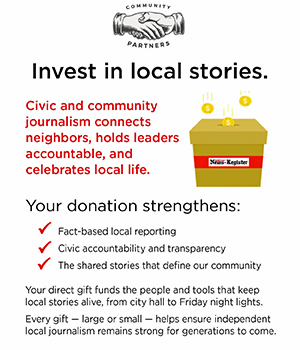Kevin Chambers: A decentralized future
In the early 1990s, the internet was a new and powerful, yet largely untested, tool. A movement emerged with early adopters defining its scope and cultural significance. Calling themselves “Cypherpunks,” they idealized the internet as a place embodying two important principles: privacy and freedom.
They aimed to build a digital world where people could be anonymous and free from governments and corporate oppressions. From this informal group arose an online presence — Satoshi Nakamoto. You might not know this name, but you probably recognize Nakamoto’s creation: Bitcoin.
Bitcoin is the first, and still most popular, decentralized “cryptocurrency.” Essentially, it is a digital coin that can be sent electronically from one person to another. Unlike a bank, a credit card company or a payment processing service like PayPal or Apple Pay, Bitcoin entails no third-party transaction verification. Instead, deals are recorded on a public ledger shared to a network of computers all around the world. Users are identified solely by their online Bitcoin address. This method of transaction appealed to the Cypherpunks: every user is anonymous, without oversight from governments or corporations.
Unlike government-backed currency, cryptocurrencies cannot be manipulated. The U.S. Treasury has the authority to print money. Inflation occurs when too many dollars are printed. In other words, the U.S. government can artificially change the value of dollars, while Bitcoin cannot be influenced by governments.
Another advantage of cryptocurrencies is their lack of connection to financial institutions, which garner distrust through financial crises. They are open 24-7, and immune to bank closures.
Finally, for many people working in a foreign country, sending money home using services like Western Union is very expensive. Online currencies offer free or inexpensive transfers, even for very small amounts, all around the world.
The downside of an anonymous, hard-to-track currency is exemplified by the website Silk Road, a notorious darknet market site on the Tor Network, also known as the Dark Web, that sold drugs, hacking services and other illegal activity. The Silk Road used only Bitcoin to transact. It was dismantled in 2013, and its founder, Ross Ulbricht, was sentenced to life in prison. The Silk Road exposes a major problem with cryptocurrencies: they can be used by criminals to launder money and facilitate illegal activity.
Governments have attempted to combat this problem through heavy regulation of the exchanges, allowing people to transfer cryptocurrencies into hard currencies.
Soon after the creation of Bitcoins, various online markets were created to easily exchange Bitcoin into currency. These markets, private companies, are similar to currency markets around the world, where traders can exchange dollars for euros and Chinese yuan for Mexican pesos. When the price of Bitcoin — which can be divided down to 8 decimal places — is quoted, it is most often based on the exchange value compared to the U.S. dollar.
Companies also started offering Bitcoin “wallet,” or storage services. The introduction of third-party companies works contrary to the ethos and purpose of the Bitcoin creators. Bitcoin is used to facilitate online transactions. At first, most of these transactions were done between individuals, primarily for internet services.
As Bitcoin has gained notoriety and the stock of total Bitcoins has grown, companyies like Subway, Overstock.com, and Expedia.com have started to embrace it as well.
The public ledger on which each transaction is recorded, known as “the blockchain,” is the real genius of Bitcoin, with massive implications for the future of financial institutions and other industries. People or companies can register to store this ledger on their computers — a process called “Bitcoin mining.” Bitcoin miners are compensated with brand new Bitcoins for helping secure and record the transactions on the blockchain.
This system does four essential things.
~ It has thousands of computers verifying each transaction. If there is a problem, or someone tries to alter a transaction, it will be detected by someone.
~ It makes the transactions public.
~ It renders the transactions irreversible.
~ And, finally, it allows a steady stream of new Bitcoins into the market.
Originally, Bitcoin could be mined from home computers. The algorithms and storage requirements were not overwhelming. Now, the only way to compete as a Bitcoin miner is to have essentially a warehouse full of dedicated computers and servers, because the algorithm becomes more difficult as the number of Bitcoins and people trying to mine them increases.
Blockchain has other applications. Any process requiring verification could be put on a blockchain, including: security trading, election voting verification, government document validation, supply chain management, HR compliance, health insurance or websites. Any system relying on a third party to verify or host something could be replaced by a decentralized system similar to the blockchain. Its potential has attracted big money: venture capital firms invested almost $1 billion in blockchain companies in 2017.
Although Bitcoin is called a cryptocurrency, it does not act like traditional currencies. When the U.S. dollar departed from the gold standard valuation method in the 1970s, all currencies became priced relative to other currencies. This produces exchange rates — an indicator of economic health, a country’s foreign trade policy and political or social issues.
As a currency value increases, a country’s exports grow more expensive and imports become cheaper. Higher currency prices tip the balance of trade (the ratio of imports to exports) toward importing more goods than are exported. Several of factors can influence exchange rates, including inflation, interest rates and political stability.
Bitcoin doesn’t contain any of the underlying economic factors to determine its price, or exchange rate. Its value, different from its price, derives from its ability to facilitate online transactions. In a perfect world, the price of Bitcoin would reflect its value. However, without any underlying fundamental value measures other currencies have, it is very hard to know if the price of Bitcoin is reflective of its value. However, its fundamental value and price will converge as the number of transactions and availability of Bitcoin increase.
In late 2017, Bitcoin was listed on the Chicago Mercantile Exchange (CME), one of the largest commodity exchanges in the world. The CME is an exchange for investors or companies to buy futures of a certain commodity. Futures are contracts designed to purchase a commodity at a pre-determined date and price. These can be used for hedging or speculative purposes. For example, an airline can buy jet fuel futures to lock in a price to hedge against fuel price increases. Also, investors can buy commodities for speculative purposes to make money off price fluctuations.
The CME listing gave rise to a conversation for Bitcoin to be treated more like a commodity. This method of valuation may be more appropriate; however, the lack of fundamental value is still a struggle to determine. There is no hedging market for Bitcoins. There is no balancing force to the speculator investors. The vast majority of people buying Bitcoin are buying it for speculation. They think the price will go up tomorrow, or over the next few months, so they buy today.
In terms of a commodity, Bitcoin is most similar to our good friend, gold. Gold also has a problem with its price and fundamental value being at odds. The price of gold fluctuates daily. It is impacted by its primary use. While gold has some limited uses in manufacturing and technology, the consumer gold market is dominated by jewelry. In fact, 48 percent of the world’s gold is in jewelry. Surprisingly, only 17 percent can be found in central bank vaults. This means the 21 percent of gold owned by investors makes speculative purposes the second most common use of gold.
Gold has significant historical value. Even today, it is considered, by some, a safe investment. On June 24, 2016, the price of gold surged. Was there a problem at a gold mine? No. Was there another use for gold in a new technology product? No. On June 23, 2016, the UK voted to leave the European Union. Gold has a perceived security value.
Proponents argue that Bitcoin is the gold of the future. If gold has historical significance, Bitcoin has futuristic relevance. Investors consider gold safe because no government can render it less valuable; whereas any government can make their currency less valuable by printing more of it.
Likewise, Bitcoin will continue to be mined, but it doesn’t increase or decrease production based on global events. Bitcoin is apolitical, just like gold. For many, Bitcoin represents digital gold.
Looking ahead, it will be interesting to see the future of cryptocurrencies. From the all-time high in late 2017, Bitcoin and other crypto prices have fallen significantly. They will need to increase their essential value as a medium of exchange to be relevant.
Regardless, blockchain technology, debuted with Bitcoin, has staying power. The most likely scenario is that institutions will integrate the technology developed by Satoshi Nakamoto into their current systems.
The financial industry co-opting the blockchain technology was never the goal of the radical Cypherpunks, but they managed to impact our world nonetheless. As we move to a decentralized system of verification, transactions will be more efficient, transparent and more secure.













Comments